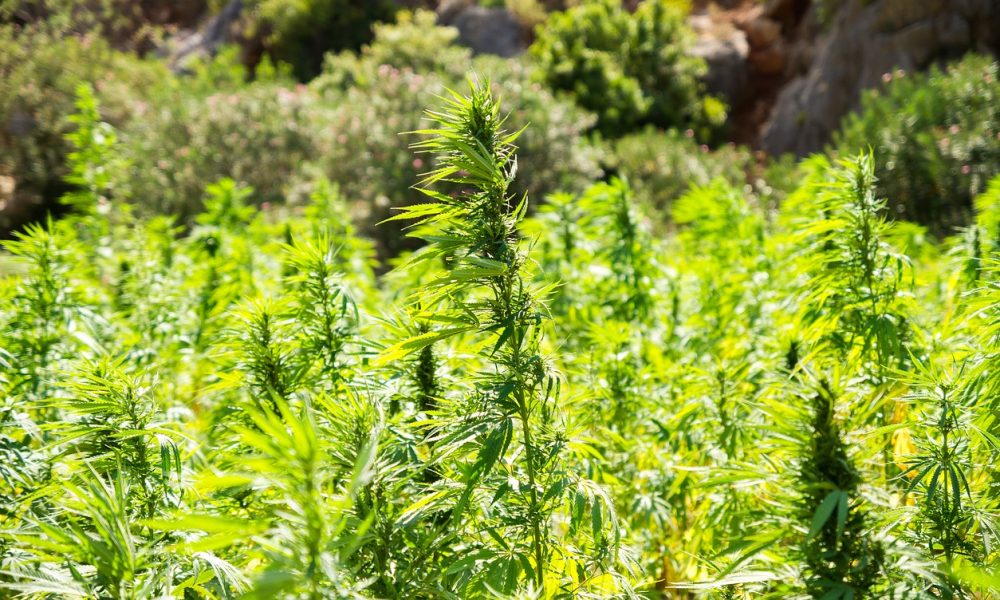Attorneys general from 20 states and Washington, D.C. are asking congressional leaders to take action on intoxicating hemp products that became legal through the 2018 Farm Bill. Federal lawmakers should amend the definition of hemp, they wrote in a letter sent on Wednesday, and clarify that states can take their own measures to regulate the plant and its derivative products.
“As Congress prepares to embark on a new five-year reauthorization of the Farm Bill, we strongly urge your committees to address the glaring vagueness created in the 2018 Farm Bill that has led to the proliferation of intoxicating hemp products across the nation and challenges to the ability for states and localities to respond to the resulting health and safety crisis,” the top state law enforcement officials wrote. “We urge Congress in the strongest possible terms to address this reckless policy.”
Led by Indiana Attorney General Todd Rokita (R) and Arkansas Attorney General Tim Griffen (R) to top lawmakers on the House and Senate agriculture committees, the letter is also signed by bipartisan attorneys general from California, Colorado, Connecticut, Georgia, Hawaii, Iowa, Kansas, Maryland, Minnesota, Missouri, North Carolina, North Dakota, Oregon, Pennsylvania, South Dakota, Tennessee, Virginia, Washington State and Washington, D.C.
Upon its passage, the 2018 Farm Bill “seemed clear at the time in its intentions—reintroducing industrial hemp as an agricultural commodity, while maintaining existing federal prohibitions on cannabis products and their use,” the letter says.
But “bad actors have exploited” that reform, it continues, and “the reality is that this law has unleashed on our states a flood of products that are nothing less than a potent form of cannabis, often in candy form that is made attractive to youth and children—with staggering levels of potency, no regulation, no oversight, and a limited ability for our offices to rein them in.”
The group calls for “much-needed improvements to the statute” that would “clarify that there is no federal hemp intoxicants loophole,” though the letter does not detail how such a statute might be crafted.
In a newsletter email about the new letter, the Attorney General Alliance, a bipartisan nonprofit, noted that the current law exempts hemp derivatives and extracts—a possible area for revision.
“The loophole in the 2018 Farm Bill’s definition of hemp, which specifically includes all derivatives, extracts, and cannabinoids of the cannabis plant, has created a gray market for these products that is rapidly expanding into a $28 billion industry,” the group wrote. “Although these products are often just as potent, if not more potent, than state-regulated cannabis products, they are produced with no regulatory oversight, packaged as traditional non-cannabis food products, and sold in unlicensed establishments like gas stations and convenience stores.”
In states that have legalized marijuana itself, products are typically subject to testing for potency and adulterants, and laws generally prohibit advertising or products designed to appeal to youth. But only a handful of states have taken steps to independently regulate intoxicating hemp products—among them, Minnesota, Massachusetts, Florida and South Dakota.
While hemp itself contains less than 0.3 percent THC under the current federal definition, other cannabinoids in hemp can be chemically converted into psychoactive compounds, including THC.
Congressional researchers cautioned last November that varying policy priorities among industry stakeholders could make the task of updating the federal farm bill more difficult.
—
Marijuana Moment is tracking more than 1,400 cannabis, psychedelics and drug policy bills in state legislatures and Congress this year. Patreon supporters pledging at least $25/month get access to our interactive maps, charts and hearing calendar so they don’t miss any developments.
Learn more about our marijuana bill tracker and become a supporter on Patreon to get access.
—
“These interest groups often have differing priorities, which may complicate U.S. hemp policymaking,” the Congressional Research Service (CRS) report said. “Moreover, the interests of these groups often span the use of hemp as an industrial input, as a food ingredient, and as a dietary supplement ingredient.”
The CRS report also referenced several recent hemp bills that federal lawmakers may consider folding in to the broader agricultural legislation.
One bipartisan bill filed last March seeks to end what critics say is a “discriminatory” federal policy that bars people with prior felony drug convictions from owning or leading legal hemp businesses. Another bipartisan measure would reduce regulations on farmers that grow industrial hemp for non-extraction purposes.
Top of mind for other hemp stakeholders and legislators is their interest in finding a regulatory pathway to allow for the lawful marketing of hemp products like CBD oil as dietary supplements and in the food supply. The Food and Drug Administration (FDA) has regulatory jurisdiction over that issue, but at the beginning of last year, the agency said it didn’t have a pathway to make it happen and instead offered to work with Congress on a solution.
In response, Sens. Ron Wyden (D-OR), Rand Paul (R-KY) and Jeff Merkley (D-OR), along with Rep. Earl Blumenauer (D-OR), filed legislation last July that would remove regulatory barriers that FDA claims prevents it from allowing CBD marketing.
The new letter, to House Agriculture Committee Chair Rep. Glenn Thompson and ranking member Rep. David Scott as well as Senate Agriculture, Nutrition and Forestry Committee Chair Sen. Debbie Stabenow and ranking member Sen. John Boozman, was first reported by Politico.
Read the full letter from the 21 attorneys general below:
ATF Agent Stops Gun Sale Over Marijuana Odor And DOJ Argues Cannabis Consumers Don’t Have 2nd Amendment Rights
Photo courtesy of Pixabay.
Read the full article here









